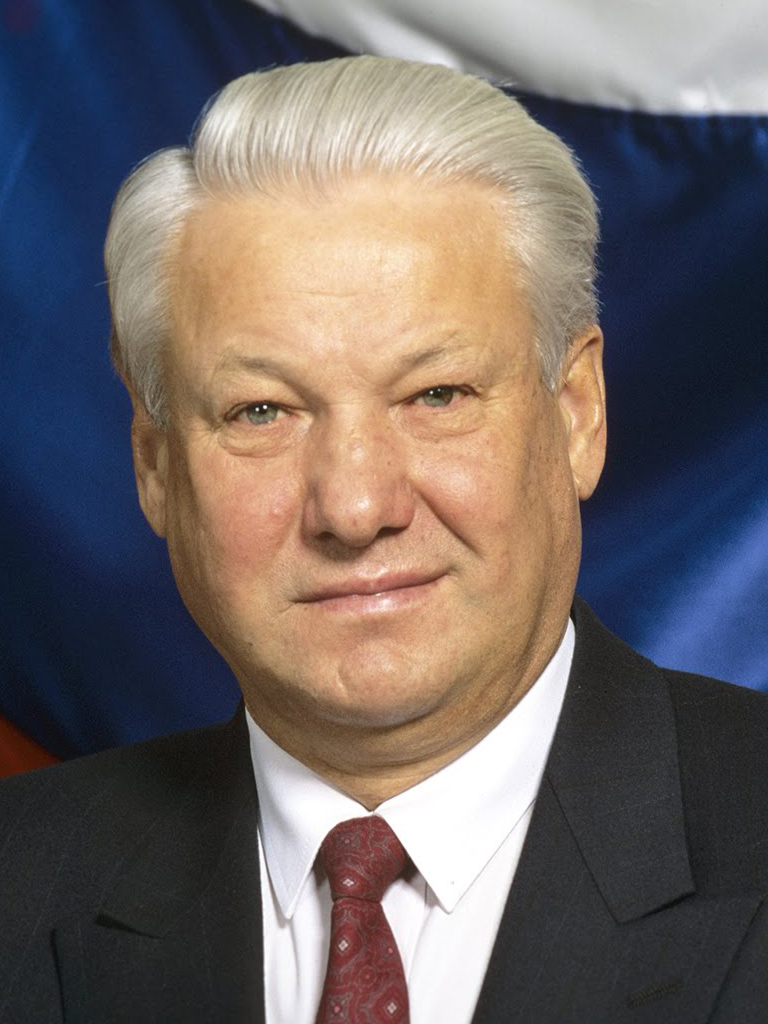More languages
More actions
(Soviet politician) Tag: Visual edit |
mNo edit summary Tag: Visual edit |
||
| Line 1: | Line 1: | ||
{{Infobox person|name=Boris Yeltsin|native_name=Борис Ельцин|image=Boris Yeltsin.png|birth_date=1 February 1931|birth_place=Butka, [[Russian SFSR]], [[Soviet Union]]|image_size=200|death_date=23 April 2007|death_place=[[Moscow]], [[Russian Federation]]|death_cause=Heart failure}} | {{Infobox person|name=Boris Yeltsin|native_name=Борис Ельцин|image=Boris Yeltsin.png|birth_date=1 February 1931|birth_place=Butka, [[Russian SFSR]], [[Soviet Union]]|image_size=200|death_date=23 April 2007|death_place=[[Moscow]], [[Russian Federation]]|death_cause=Heart failure}} | ||
'''Boris Yeltsin''' (1 February 1931 – 23 April 2007) was the first president of the Russian Federation, ruling from 1991 to 1993 (de jure) and from 1993 to 1999 (de facto). He implemented [[Neoliberalism|neoliberal]] [[shock therapy]] policies that allowed [[Bourgeoisie|bourgeois]] elites to take control of Russia's economy.<ref>{{Citation|author=Anders Aslund|year=1999|title=Russia's Collapse|title-url=https://web.archive.org/web/20070927201642/http://www.foreignaffairs.org/19990901faessay1007/anders-aslund/russia-s-collapse.html|publisher=Foreign Affairs}}</ref> | '''Boris Nikolayevich Yeltsin''' (1 February 1931 – 23 April 2007) was the first president of the Russian Federation, ruling from 1991 to 1993 (de jure) and from 1993 to 1999 (de facto). He implemented [[Neoliberalism|neoliberal]] [[shock therapy]] policies that allowed [[Bourgeoisie|bourgeois]] elites to take control of Russia's economy.<ref>{{Citation|author=Anders Aslund|year=1999|title=Russia's Collapse|title-url=https://web.archive.org/web/20070927201642/http://www.foreignaffairs.org/19990901faessay1007/anders-aslund/russia-s-collapse.html|publisher=Foreign Affairs}}</ref> | ||
== Soviet era == | == Soviet era == | ||
| Line 24: | Line 24: | ||
[[Category:Russians]] | [[Category:Russians]] | ||
[[Category:Former heads of state]] | [[Category:Former heads of state]] | ||
<references /> | |||
[[Category:CIA plants]] | |||
{{DEFAULTSORT:Yeltsin, Boris}} | |||
Revision as of 16:21, 2 December 2023
Boris Yeltsin Борис Ельцин | |
|---|---|
 | |
| Born | 1 February 1931 Butka, Russian SFSR, Soviet Union |
| Died | 23 April 2007 Moscow, Russian Federation |
| Cause of death | Heart failure |
Boris Nikolayevich Yeltsin (1 February 1931 – 23 April 2007) was the first president of the Russian Federation, ruling from 1991 to 1993 (de jure) and from 1993 to 1999 (de facto). He implemented neoliberal shock therapy policies that allowed bourgeois elites to take control of Russia's economy.[1]
Soviet era
In 1985, Yeltsin was brought to Moscow on Ligachyov's recommendation. Yeltsin became a candidate member of the Politburo in 1986 and criticized Ligachyov over party privileges. Gorbachev purged Yeltsin in 1987 and removed him from his position as Moscow party secretary.[2]
In the March 1989, Yeltsin was elected to the USSR Congress of People's Deputies for Sverdlovsk. He was elected to the same position in the RSFSR in March 1990 and became Chair of the RSFSR Supreme Soviet in May.[2] He created a system of dual power in opposition the all-Union government controlled by Gorbachev.[3]
Yeltsin left the CPSU in July 1990.[2] By 1991, he controlled most of the media in the USSR.[3]
Shock therapy
Over 100,000 state-owned enterprises were privatized and sold to the highest bidder from 1991 to 1995.[4] As a result, the poverty rate in Russia increased from 2% to 50%[5] and the population decreased for 15 years straight.[6] Real income dropped by at least 70% from 1990 to 1997.[4]
1993 coup
On 21 September 1993, in breach of the constitution, Yeltsin disbanded the Supreme Soviet and Congress of People's Deputies because it had been blocking his economic liberalization policies. The Supreme Soviet then declared Yeltsin removed from the presidency for breaching the constitution, and Vice-President Alexander Rutskoy was sworn in as acting president.
Between 21 and 24 September, Yeltsin was confronted by popular unrest. Demonstrators protested the terrible living conditions under Yeltsin. GDP had declined by half, corruption and violent crime was skyrocketing, medical services, food and fuel were increasingly scarce and life expectancy was falling across the country. Yeltsin directed tanks to shell the Russian parliament. The attack killed 187 people and wounded almost 500 others.
Foreign election interference
The 1996 Russian presidential election was interfered with by the USA. During the election campaign American political advisors secretly colluded with Yeltsin to influence the election. The advisors kept it a secret until after he won when they confessed and began to brag about their influence over the election.[7]
References
- ↑ Anders Aslund (1999). Russia's Collapse. Foreign Affairs.
- ↑ 2.0 2.1 2.2 Roger Keeran, Thomas Kenny (2010). Socialism Betrayed: Behind the Collapse of the Soviet Union: 'Crisis and Collapse, 1989-91' (pp. 196–197). [PDF] iUniverse.com. ISBN 9781450241717
- ↑ 3.0 3.1 Roger Keeran, Thomas Kenny (2010). Socialism Betrayed: Behind the Collapse of the Soviet Union: 'Crisis and Collapse, 1989-91' (pp. 170–171). [PDF] iUniverse.com. ISBN 9781450241717
- ↑ 4.0 4.1 Brian Becker (2007-06-01). "The criminal legacy of Boris Yeltsin" Liberation School. Archived from the original on 2021-05-11. Retrieved 2022-06-21.
- ↑ Branko Milanovic. Income, Inequality, and Poverty during the Transition from Planned to Market Economy (p. 36). [PDF] World Bank.
- ↑ "Russia Population". Worldometers. Retrieved 2022-03-12.
- ↑ ELEANOR RANDOLPH (July 9, 1996). "Americans Claim Role in Yeltsin Win" Los Angeles Times.
